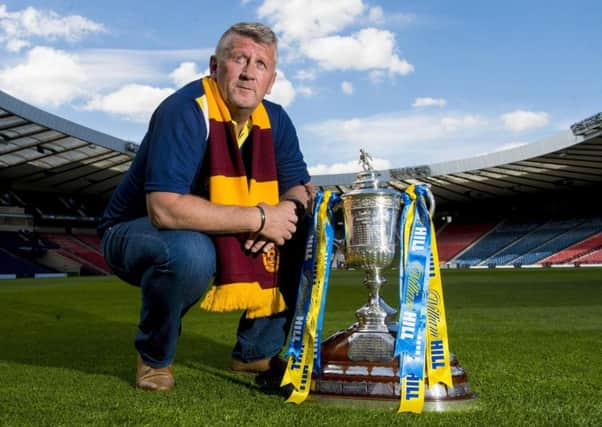Iain Ferguson recalls class of 91 and a Scottish Cup final to savour


“I played in a very, very good Dundee United team, who had won trophies, and who got to two Scottish Cup finals and a Uefa Cup final when I was there, and we should have won at least two of them,” says Ferguson. “There was a psychological thing…
“A lot of those players who had played with United over a number of years, they’d won the league and League Cups but they seemed to go to Hampden and freeze. Even on the occasion when we played St Mirren and were expected to win. There was a thing about the team: they just froze and they could not seem to play there.”
Advertisement
Hide AdAdvertisement
Hide AdBy the occasion of the so-called family final between Dundee United and Motherwell in 1991, Fergie had turned foe: “I remember being in the tunnel with Davie Cooper, who was a real good pal of mine. We were lining up. I did say: ‘get into this mob, they cannae play at Hampden’. Half of them turned round. I was like: ‘well, it’s true isn’t it?’”
United might have thought they were preparing to have the last laugh after coming back from 3-1 down to equalise in the final seconds. But in extra-time, Motherwell drew on their reserves of fortitude and scored a winner through Stevie Kirk. As a new documentary entitled Steelmen makes clear by framing the memorable victory in the context of the then uncertainty surrounding the future of Ravenscraig, it was a victory that acted as a balm.
It took Ferguson a while to recognise this. He was the most local of the team having grown up just a few miles from Fir Park and played for the Motherwell boys’ club before signing for Dundee aged 13.
Even so, as many as 28 years later there’s still no disguising his dismay at being substituted just after the hour mark with the score at 1-1 after Motherwell had taken a first-half lead – thanks to his header. Nor does it necessarily comfort him to know that it was his great friend Kirk, the matchwinner, who replaced him. As well as the imminent shutting of the local steelworks, there was another, deeply personal, context: the opposing managers, brothers Tommy and Jim McLean, had lost their father, Tom, in the week preceding the Hampden showpiece. This might help explain Tommy’s unusual indecision on the eve of the final.
“Tommy came down the night before and named the team – every position apart from my own,” recalls Ferguson. “He pulled me aside after everyone had left and asked: ‘would you rather I start with you and take you off and put Kirkie on or start with Kirkie?’ I said: ‘what do you mean? I do not get that. Is it multiple choice?’ I told him to start with me and see how it goes.
“So he did and I was doing as well as anyone, and scored the first goal. As soon as 63 minutes were up, I said to Maurice Malpas, who was marking me: ‘That better not be my number or I will go mental’. Sure enough it was. That’s when me and Tommy fell out. He should really have sold me straightaway.”
Ferguson stayed another season, flitting in and out of the team, before joining Airdrie. His days as prodigious goalscorer were coming to an end – but what a bonus it had been to win a winner’s medal for his hometown club in what stands as one of the finals of the century.
Its renown has only accumulated over the years, partly for unwelcome reasons. Four of Motherwell’s squad, including Phil O’Donnell, the youngest player on the pitch, have since passed away. On the day itself, despite Motherwell having won the trophy for the first time in 39 years, Ferguson felt strangely flat. Perhaps it was the knowledge so many of his old team-mates were reeling from another Hampden defeat. He swapped his Motherwell shirt with Dave Bowman, who had scored United’s first equaliser.
Advertisement
Hide AdAdvertisement
Hide Ad“That was a bit silly because it meant I had three losing Dundee United tops,” says Ferguson. In a mark of the man, Bowman returned the top to its original owner on the 25th anniversary of the trophy win. “Davie was a good friend,” he says. “I watched a lot of good friends walk away from that cup final in tears.”
“We went back to Fir Park. The fans got in, we were in the stand with the cup and stuff. Me and Davie [Cooper] left. We ended up going to his favourite restaurant in Hamilton called Santa Lucia.
“He was in every day. Myself and my wife and Davie and his partner sat in our Motherwell blazers and had a meal and a couple of drinks. It was the next day that really made it.”
This was when the open-topped bus made its way around the neighbourhoods of Ferguson’s youth with delight evident across so many familiar faces. It took a very special team to put a smile on the face of a community where the premier source of employment in town was in the process of being scorched.
Later, at one of the four finals Motherwell have reached since, all ending in defeat, his old team-mate Colin O’Neill turned to ask: do you want them to win Fergie? “I told him of course I do,” says Ferguson. “‘I don’t!’ he says. ‘We will not get invited back!’ But to be honest I think the ’91 team, whatever else happens, will always have a place in the Motherwell fans’ hearts.”
l Steelmen has been produced by purpleTV for BBC ALBA. It will air tomorrow at 9pm, and be available for 30 days thereafter on BBC iPlayer.